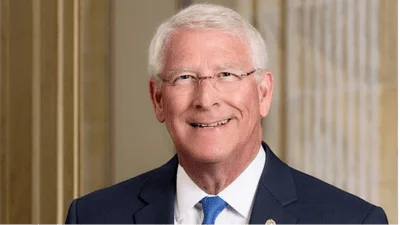WASHINGTON - The House Appropriations Committee today released the draft fiscal year 2021 Financial Services and General Government funding bill, which will be considered in subcommittee tomorrow. The legislation provides annual funding for the Department of the Treasury, the Judiciary, the Executive Office of the President, and other independent agencies, including the Small Business Administration.
For fiscal year 2021, the draft bill includes $24.64 billion in discretionary funding, an increase of $808 million over the 2020 enacted level. In addition, to respond to the coronavirus pandemic and the ensuing economic recession, the bill provides $61 billion for broadband infrastructure and $6 billion for the modernization of Federal buildings.
The Financial Services and General Government bill supports a broad range of functions and services in both the Executive and Judicial branches that are essential to the operation of the Federal Government. In addition, the bill supports programs that assist and protect the public, such as shielding consumers from defective and dangerous products, assisting small businesses, investing in distressed communities, and ensuring the integrity of Federal elections. The bill includes significant funding increases to support these critical functions.
“Now more than ever, it is important that we provide the Federal government with the resources it needs to protect our consumers, ensure the integrity of our markets, support small businesses, and ensure equal internet access. This year’s FSGG funding bill takes significant steps to accomplish each of those goals," said House Appropriations Subcommittee on Financial Services and General Government Chairman Mike Quigley. “From increased funding for the IRS to assist taxpayers and bolster enforcement, to investing in community development-this bill will help stabilize our economy for everyday Americans as we navigate the road to recovery. It also continues investment in election infrastructure and security to help our state and local governments conduct safe and secure elections."
“This bill is about protecting hardworking families, workers, and small businesses, who are facing serious hardship because of the coronavirus. That’s why, in addition to increased investments in distressed communities and more resources to help small businesses access training and resources needed to succeed, our bill includes strong emergency funding to expand broadband to unserved communities, bringing connectivity across our nation," said House Appropriations Committee Chairwoman Nita M. Lowey. “The bill also increases funding to improve election security and integrity, because our democracy belongs in the hands of American voters."
A summary of the draft fiscal year 2021 Financial Services and General Government bill is below. The text of the bill is. The subcommittee markup will be webcast live and linked from https://appropriations.house.gov/events/markups.
Bill Summary:
Department of the Treasury - For fiscal year 2021, the bill provides a total of $13.66 billion in discretionary appropriations for the Department, an increase of $601.4 million above the FY 2020 enacted level. The bill does not include the proposed transfer of the United States Secret Service from the Department of Homeland Security to the Department of the Treasury. Of the total provided for the Department of the Treasury, the bill includes:
* $231.9 million for Departmental Offices Salaries and Expenses, an increase of $3.5 million above the FY 2020 enacted level and $9.6 million below the President’s budget request.
* $172.8 million for the Office of Terrorism and Financial Intelligence, an increase of $3 million above the FY 2020 enacted level, to continue investments to protect the integrity of the financial system.
* $127 million for the Financial Crimes Enforcement Network, an increase of $1 million above the FY 2020 enacted level, to boost efforts to combat terrorist financing and money laundering.
* $121.8 million for the Alcohol and Tobacco Tax and Trade Bureau, an increase of $2.2 million above the FY 2020 enacted level.
* $273.5 million for Community Development Financial Institutions, an increase of $11.5 million above the FY 2020 enacted level and a rejection of the proposal in the President’s budget to eliminate the program entirely. The total amount includes $10 million to increase the availability and affordability of small-dollar loans.
* $231.4 million for Inspectors General offices for the Treasury Department, an increase of $3.2 million above the President’s budget request, to ensure robust oversight of Departmental policies and practices.
* Internal Revenue Service (IRS) - The bill includes $12.1 billion for the IRS, an increase of $606.4 million above the FY 2020 enacted level. Of this amount, the bill includes:
** $2.6 billion, an increase of $91 million above the FY 2020 enacted level, for Taxpayer Services. This total includes growth for the Volunteer Income Tax Assistance Matching Grants Program, Low Income Taxpayer Clinic, and the Taxpayer Advocate as well as continued support for Tax Counseling for the Elderly.
** $5.2 billion, an increase of $196 million above the FY 2020 enacted level, for Enforcement.
** $4.1 billion, an increase of $249 million above the FY 2020 enacted level, for Operations Support.
** $250 million, an increase of $70 million above the FY 2020 enacted level, for Business Systems Modernization.
Executive Office of the President - The bill includes a total of $741.2 million, an increase of $14.2 million above the FY 2020 enacted level and $387.8 million above the President’s budget request.
* Office of Management and Budget (OMB) - The bill provides $107.2 million for OMB, an increase of $5.6 million above the FY 2020 enacted level and $8.5 million below the President’s budget request.
* Office of National Drug Control Policy (ONDCP) - The bill rejects the Administration’s proposed transfer or elimination of ONDCP grant programs and includes:
** $290 million for the High Intensity Drug Trafficking Areas Program, an increase of $5 million above the FY 2020 enacted level; and
** $102 million for the Drug-Free Communities Program, an increase of $750,000 above the FY 2020 enacted level.
The Judiciary - The bill includes a total of $7.8 billion in discretionary appropriations, an increase of $287 million above the FY 2020 enacted level.
* Courts of Appeals, District Courts, and Other Judicial Services - $5.4 billion, an increase of $163 million above the FY 2020 enacted level, to support court operations and increased services in Probation and Pretrial.
* Defender Services - $1.32 billion, an increase of $88 million above the FY 2020 enacted level, to support operations and expenses associated with panel attorney compensation.
* Court Security - $664 million, an increase of $25 million above the FY 2020 enacted level, to support security needs and protective services in courthouses, as identified by the U.S. Marshals Service.
Additionally, the bill extends temporary judgeships in several districts.
District of Columbia - The bill includes a total of $762.1 million, an increase of $47.8 million above the FY 2020 enacted level and $8.8 million above the President’s budget request.
* $40 million for D.C. Resident Tuition Support, reversing the elimination of the program proposed by the Administration.
* $4 million, an increase of $1 million above the President’s request, for HIV/AIDS Testing and Treatment to help prevent the spread of HIV/AIDS in the District of Columbia.
* $8 million, equal to the FY 2020 enacted level, to fund infrastructure improvements for the D.C. Water and Sewer Authority.
In addition, the bill removes objectionable policy riders previously carried that intrude on home rule in the District of Columbia:
* Eliminates a ban on the use of local funds for abortion services;
* Eliminates a ban on the use of local funds to legalize marijuana;
* Eliminates a ban on the use of funds for needle exchange programs; and
* Eliminates a provision appropriating local District funds.
The bill also restricts the President’s ability to federalize the District of Columbia Metropolitan Police Department.
Independent Agencies:
* Consumer Product Safety Commission (CPSC) - The bill funds the CPSC at $137 million, an increase of $4.5 million above the FY 2020 enacted level and $2 million above the President’s request. Within the total, $1.3 million is provided for Virginia Graeme Baker Pool Safety grants.
* Election Assistance Commission (EAC) - The bill provides $500 million for Election Security Grants, an increase of $75 million above the FY 2020 enacted level, to augment State efforts to improve the security and integrity of elections for Federal office. In addition, $19.1 million is included for EAC operating expenses, an increase of $3.9 million above the FY 2020 enacted level and $6 million above the President’s budget request.
* Federal Communications Commission (FCC) - The bill includes $376.1 million for the FCC, an increase of $37.1 million above the FY 2020 enacted level. This includes funding to implement new broadband mapping legislation. Additionally, the bill includes $61 billion in emergency funding for the FCC to expand availability of broadband to unserved areas, as well as multi-year funding for broadband mapping and replacement of telecommunications equipment deemed to pose a national security threat to the United States.
* Federal Trade Commission (FTC) - The bill includes $341 million for the FTC, an increase of $10 million above the FY 2020 enacted level, to bolster antitrust and consumer protection work.
* General Services Administration (GSA) Federal Buildings Fund (FBF) - The bill includes $9.1 billion in spending authority for the FBF. The total funding level includes:
** $201 million for Washington, DC Department of Homeland Security Consolidation at St. Elizabeths;
** $9 million for Washington, DC Southeast Federal Center Remediation;
** $586 million for Repairs and Alterations; and
** Additionally, the bill provides $6 billion for land port of entry modernization, construction, repairs and alterations to Federal buildings, and administrative support for portfolio management.
* National Archives and Records Administration (NARA) - The bill provides $361.5 million for NARA operating expenses, an increase of $2.5 million above the FY 2020 enacted level and $4.5 million above the President’s request. Of this amount, $2 million is provided for implementation of the Civil Rights Cold Case Record Collections Act of 2018. In addition, the bill includes $7 million for the National Historical Publications & Records Commission Grants Program.
* Office of Personnel Management (OPM) - The bill includes $339 million, an increase of $8.5 million above the FY 2020 enacted level, for OPM to manage and provide guidance on Federal human resources and administer Federal retirement and health benefit programs.
* Securities and Exchange Commission (SEC) - The bill includes $1.92 billion, an increase of $105 million above the FY 2020 enacted level, for SEC salaries and expenses. The bill also provides funding for move costs related to the SEC’s headquarters and San Francisco regional offices.
* Small Business Administration (SBA) - The bill provides a total of $939.4 million for SBA, an increase of $200.4 million above the President’s budget request. Of this amount, the bill includes $277 million, an increase of $16 million above the FY 2020 enacted level and $109.4 million above the President’s request, for Entrepreneurial Development Programs, including:
** $140 million for Small Business Development Centers;
** $35 million for Microloan Technical Assistance;
** $20.5 million for the State Trade Expansion Program; and
** $24.5 million for Women’s Business Centers.
Policy Provisions -
* Federal Employment for DACA Recipients - Includes new language making DACA recipients eligible for Federal employment.
* Federal Worker Protections - Includes a new provision prohibiting Federal agencies from imposing new union contracts that were not agreed to through good faith collective bargaining negotiations.
* Implementation of Social Media EO - Includes new language blocking the FTC and FCC from needlessly expending resources implementing an executive order on online platforms before Congress completes its work in this area.
* Blocks OPM Merger with GSA - Includes new language rejecting the Administration’s proposed merger of OPM with GSA.
* Commission on Federal Naming and Displays - Includes a new provision that creates a commission to identify and recommend name changes or removal of Federal property that is inconsistent with the values of diversity, equity, and inclusion.
* Campaign Finance Transparency - Eliminates three provisions that limit transparency into political spending.
* Apportionment Transparency - Includes a new provision requiring OMB to make apportionments of appropriations publicly available in a timely manner.
* GAO Responsiveness to Congress - Includes new provisions requiring executive agencies to provide information to the Government Accountability Office promptly.
* Improvements in Budget Execution - Includes a new provision that requires budget authority be made available prudently for obligation.
* Border Wall - Includes a provision to prohibit the use of funds from the Treasury Forfeiture Fund for the construction of the President’s border wall.
Source: U.S. Department of HCA









